Mank is an undertaking. What the David Fincher film accomplishes is simply awe-inspiring. After all, at the heart of Fincher’s latest work is the making of what many in the world consider the greatest film of all-time, Citizen Kane. Now, not one day of shooting that iconic film is shown, this tale focuses on its drunken-brilliant wizard of a screenwriter, Herman Mankiewicz—or Mank as he insisted people call him.

Why Mank works so well is it is not a how did they make this classic movie film. Instead, there are layers to the creation of this masterpiece that is electrically illuminating for those of us who make witnessing Orson Welles’ work a yearly endeavor.
Everyone who saw the Welles film immediately knows who he was playing. It was common knowledge that the titular character was none other than William Randolph Hearst—the newspaper titan, who from his Xanadu home (otherwise known as Hearst Castle) had his hand in the goings-on in Tinsel Town. Among his proudest and most important was his girlfriend, Marion Davies (a dazzling Amanda Seyfried). Hearst frequently hosted movie shots and movie stars at his estate for long weekends, filled with booze, divine discussions about the news of the day, and just a general opportunity to bask in an ocean of wealth.
Also, there at the castle on many a weekend—you guessed it, Mank.
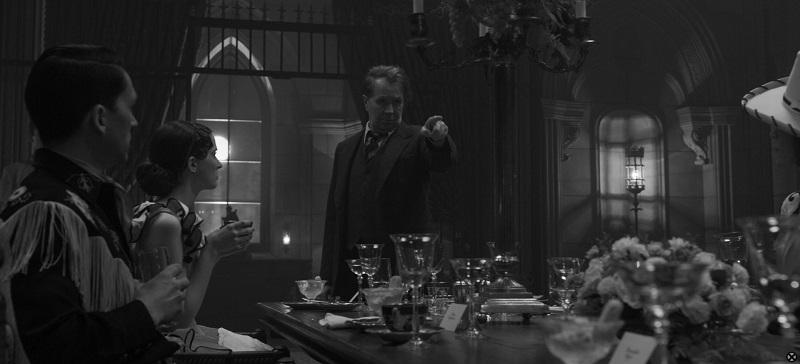
So, although there is a “mystery” as to who the Citizen Kane script is about, in the end, it seems everyone knows it’s about one of the richest men in the world.
We meet Mank as he is being brought to a California desert oasis to heal from a broken leg sustained in a car accident. He has his assistant-transcriber Rita Alexander (Lily Collins) and his full-time nurse Fräulein Frieda (Monika Gossmann), who will tend to his injuries. He has a myriad of notebooks and a speed-typer in Alexander. What he is telling is a story that we already feel and know is epic.
There are so many layers to Fincher’s film (isn’t there always), that its narrative zig-zags back and forth between Mank’s earlier time in Hollywood and his current ailing and alcohol-soaked recovery in the California desert as he pens the movie that would define him and be the greatest, most profound artifact he ever composed.
It’s safe to say a majority of the production takes place in this desert oasis where Collins, Oldman, and Gossmann put on a theatrical clinic. Fincher shoots it as if it were a stage play, yet it never fails to embody that classic tone of the legendary filmmaker. Freida and Alexander are there to help him, physically, mentally, and most importantly professionally. The weight of this project is never in question. With constant visits from studio executives to phone calls from Welles himself, Mank cannot escape the gravity of his situation.
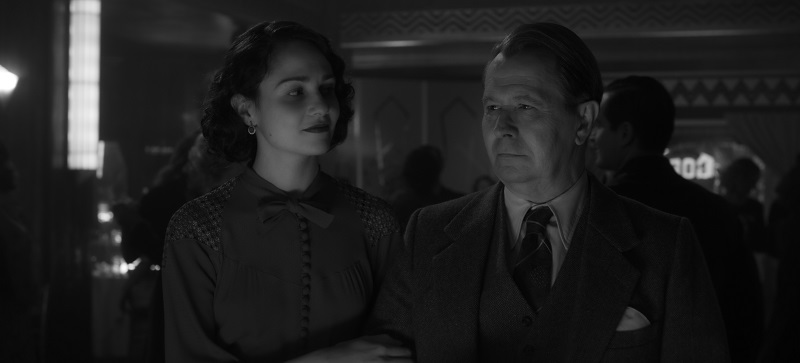
But something is piercingly clear in Mank, this is firmly a writer who keenly knows that what is expected is just a starting point of the greatness he has in store for when pen hits paper, and then fingers tap at a typewriter and a cultural stalwart will be born. Oldman plays Mank as a wild card, a man whose work is solid and filled with the promise of greatness. But genius comes with a cost in most cases. He is a rabble-rouser who doesn’t know when to not say something. This gets him trouble on numerous occasions, and it is an utter delight to witness Oldman reacting to everyone (except his wife Sara Mankiewicz—played compassionately by Tuppence Middleton) as their doubt, fear, and utter frustration is directed at his creative virtuoso.
There isn’t a single scene or moment in Mank that sits above all others, but they’re a few that a worthy of being saluted. When Mank first meats Hearst, it is a playful scene that not only introduces their unlikely kindship, but a exposes friendship with Davies that exists and is the backbone of Mank.
When Alexander and Mank are collaborating at a syncopated pace and the viewer knows exactly that the web they are weaving will become one of the greatest movies of all-time. The richness of the words he dictates to Alexander isn’t even half of what makes it so extraordinary. It is the collective realization by both cohorts that this is something special beyond the pedantic prose of the human race. What we hear Mank utter from his stationary bed are words that pulsate with life, and with the benefit of the flashbacks to his time with Hearst and that lifestyle, it reads like an indictment of American excess and the price of power and fame.
Seyfried and Oldman are a delight together. Look for both to fight for Oscar nods, she for Best Supporting Actress and he for another nod for Best Actor. Yes, Mank is Oldman’s movie. But there is something about the quiet scenes between these two unlikely friends that also provide the film with its beating emotive heart. It’s a platonic friendship that finds each supporting the other that has them bonding over more than their shared relationship with a publishing titan.
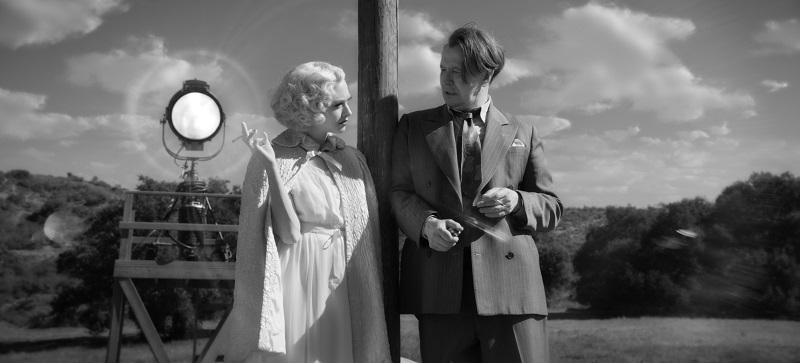
When the script becomes a finished product and the Hollywood world is not quite what sure to do with it, Fincher focuses on Mank and his progression from a hobbled writer under a deadline to an artist questioning his legacy.
There’s also a surprising political statement that Fincher and his screenwriters make that is as fitting today as it was when the California Gubernatorial election of 1934 was between an “American-First” type Republican and a Democrat who largely lost because he was labeled a socialist and never recovered. It is this moment that will split Mank from many that have stood him through his drinking and uncensored social speech.
There was a longstanding debate as to who actually wrote Citizen Kane that Mank answers without question. Welles claimed he penned it but was forced to give Mank a co-creative creative. As portrayed in Mank, this medium transcendent story came from his creative brilliance mind and his experience with Hearst, the Hearst Castle, and in particular, the Republican victory in the 1934 California Gubernatorial elections. Much is formed from those seemingly innocent items that all add up to a phenomenal look at the art of moviemaking back in the 1930s when the artform was still young and filling out its britches.
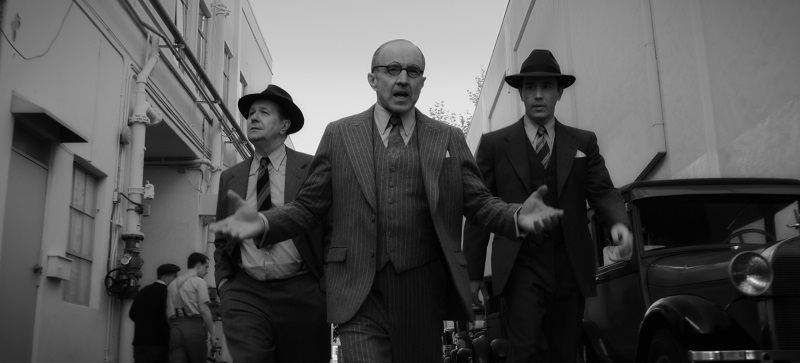
Much like all of Fincher’s films, the supporting cast delivers a performance worthy of a salute above the film’s marquee. Most notably is Collins, whose camaraderie with Mank helps drive a man to greatness, while his wife Sara tends to the kids at home that borders on desperation. Middleton’s Sara could be a thankless role, but with some wicked writing and some hallucinations by our pogromist, much is said with little.
Arliss Howard’s Louis B. Mayer is the epitome of the 30s and 40s studio head. He wields a power that can crush a person’s well-being yet sits behind some of the greatest creations that Hollywood ever produced. Howard portrays him exactly as one would expect, but with a panache that permeates every frame he visits.
Charles Dance just nails it as Hearst. He is a man of his times, yet also one who sees the need to celebrate art and artists. At the same time, Hearst is someone who is as vulnerable as he is vindictive. His relationship with Marie never feels odd or out of place, simply normal for a wealthy man and a woman in the public eye who share a passion for each other, despite what the naysayers report.
Then there’s Welles. Many have played him, most notably Liev Schreiber, in RKO 281. Yet there is something about the grounded gravitas of Tom Burke that brings the boy wonder (he was in his early 20s when he made Citizen Kane) to life in a manner that is larger than life, while intimate to those who knew him. It’s a delicate needle to thread, but Burke does it in spades.
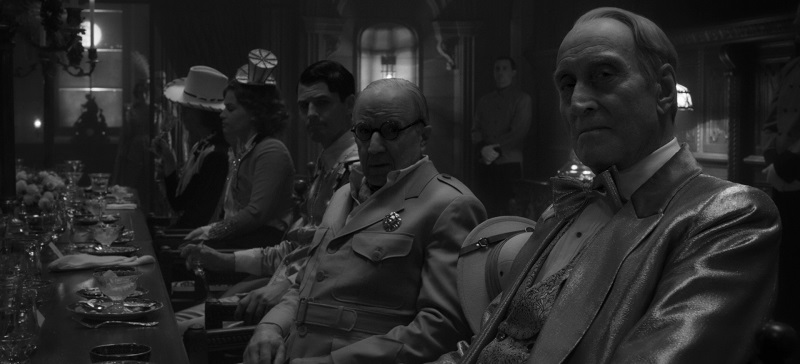
Mank is a Fincher film through and through. But as it’s shot in black and white, the helmer doesn’t get to play with a color palette that would literally bring a vibrancy to his characters. All their light comes from terrific lighting, yes, but also the projection of the person that each thespian brings to this delicious cinematic table. He’s a perfectionist. Fincher has reportedly made actors do scenes over 100 times, but you bet your bottom dollar that the one we see on the screen couldn’t be better if a magician himself wielded a magic wand.
Grade: A

